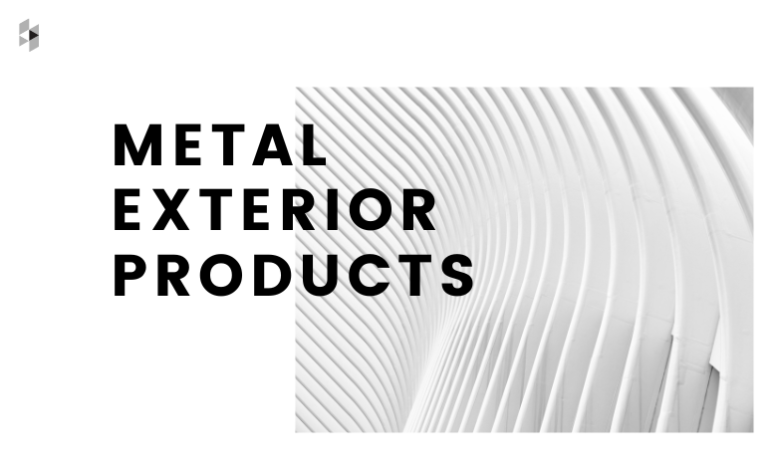A Comprehensive Guide to Metal Exterior Products

Metal exterior products have become increasingly popular in the construction industry due to their durability, versatility, and aesthetic appeal. From roofing to siding, doors, and windows, metal offers a wide range of options for enhancing the exterior of residential and commercial buildings.
Types of Metal Exterior Products
Metal Roofing
Metal roofing systems are available in various materials such as steel, aluminum, and copper. They offer exceptional durability, weather resistance, and energy efficiency, making them an attractive option for both residential and commercial properties.
Metal Siding
Metal siding provides a sleek and modern look to buildings while offering superior protection against the elements. It comes in a variety of styles, including vertical panels, horizontal lap siding, and corrugated metal sheets, allowing for versatile design options.
Metal Doors and Windows
Metal doors and windows offer strength, security, and energy efficiency. They are available in a range of finishes and styles to complement any architectural design, from contemporary to traditional.
Metal Gutters and Downspouts
Metal gutters and downspouts are essential components of a building’s drainage system, helping to channel rainwater away from the foundation and prevent water damage. They are durable, low-maintenance, and available in various profiles to suit different aesthetic preferences.
Benefits of Metal Exterior Products
- Durability: Metal exterior products are highly resistant to weathering, corrosion, and pests, ensuring long-term performance and minimal maintenance requirements.
- Energy Efficiency: Metal roofing and siding can help improve energy efficiency by reflecting heat and reducing cooling costs in hot climates.
- Aesthetic Appeal: Metal offers a sleek and modern aesthetic that can enhance the curb appeal and value of any property.
- Environmentally Friendly: Many metal exterior products are recyclable, making them a sustainable choice for environmentally conscious consumers.
Factors to Consider When Choosing Metal Exterior Products
Durability
Metal exterior products are known for their longevity, but factors such as material quality, installation method, and maintenance practices can affect their lifespan.
Energy Efficiency
The energy efficiency of metal roofing and siding depends on factors such as color, finish, insulation, and ventilation. Choosing energy-efficient options can help reduce heating and cooling costs.
Maintenance
While metal exterior products are relatively low-maintenance, regular inspections and cleaning are essential to prevent rust, corrosion, and other issues.
Aesthetic Appeal
Metal exterior products come in a wide range of colors, finishes, and profiles, allowing for customizable design options to suit any architectural style or preference.
Installation Process of Metal Exterior Products
The installation process for metal exterior products varies depending on the specific product and application. It typically involves preparation of the substrate, installation of the metal panels or components, and finishing touches such as flashing and trim.
Cost Considerations
The cost of metal exterior products depends on factors such as material, quality, size, complexity of the installation, and geographic location. While metal products may have a higher upfront cost than some other materials, their durability and longevity often result in long-term savings.
Common Issues and Maintenance Tips
Common issues with metal exterior products include corrosion, rust, dents, and fading. Regular inspection, cleaning, and maintenance can help prevent these issues and prolong the lifespan of metal products.
Environmental Impact of Metal Exterior Products
Metal exterior products are considered environmentally friendly due to their recyclability and energy efficiency. Many metal products are made from recycled materials and can be recycled at the end of their lifespan, reducing waste and conserving resources.
Innovations and Trends in Metal Exterior Products
Innovations in metal exterior products include advanced coatings and finishes, improved insulation and energy efficiency, and modular design options for easier installation and customization.
Comparison with Other Exterior Materials
Metal exterior products offer several advantages over traditional materials such as wood, vinyl, and fiber cement, including durability, longevity, energy efficiency, and aesthetic appeal. However, each material has its unique characteristics and suitability for different applications.
Conclusion
In conclusion, metal exterior products offer a versatile and durable solution for enhancing the appearance, performance, and value of residential and commercial buildings. With a wide range of options available, from roofing to siding, doors, and windows, metal products provide homeowners and builders with endless possibilities for creating beautiful and functional exteriors.
FAQs
- Are metal exterior products suitable for all climates?
- Metal exterior products are suitable for most climates, but factors such as material selection, insulation, and ventilation should be considered to ensure optimal performance and energy efficiency.
- Do metal exterior products require special maintenance?
- While metal exterior products are relatively low-maintenance, regular inspections and cleaning are recommended to prevent issues such as corrosion, rust, and fading.
- Are metal exterior products noisy during rain or hail storms?
- Metal roofing and siding can be noisier than some other materials during rain or hail storms, but proper insulation and installation techniques can help minimize noise levels.
- Can metal exterior products be painted or customized?
- Yes, many metal exterior products can be painted or customized to match specific color preferences or architectural styles. Consult with a professional installer or manufacturer for customization options.
- Are metal exterior products fire-resistant?
- Metal exterior products are generally considered fire-resistant, but the degree of fire resistance may vary depending on factors such as material thickness and coating. Check with the manufacturer for specific fire ratings and certifications.




